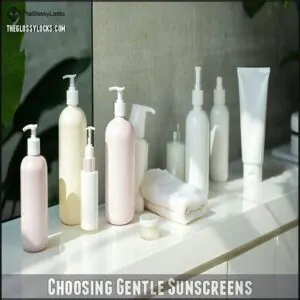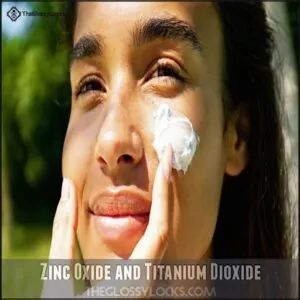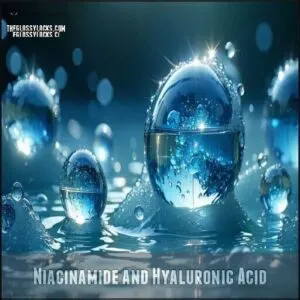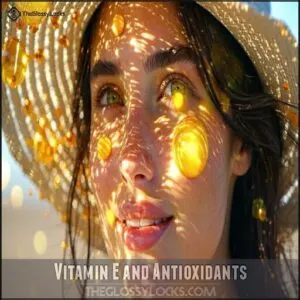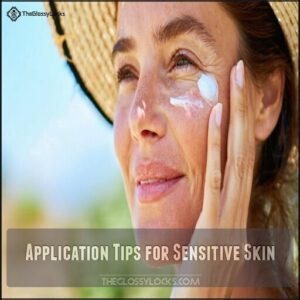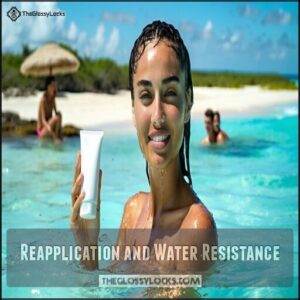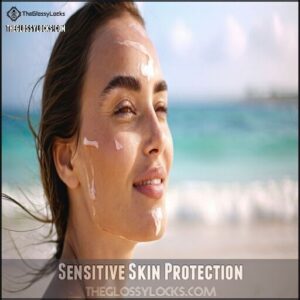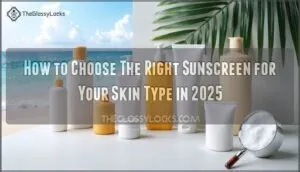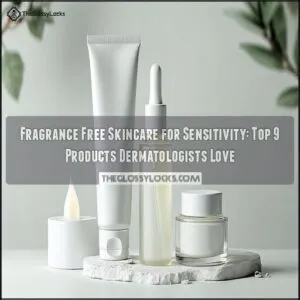This site is supported by our readers. We may earn a commission, at no cost to you, if you purchase through links.
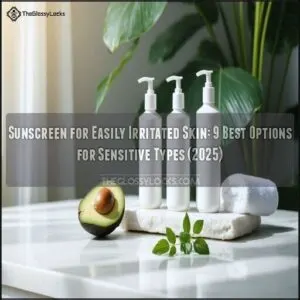 If you’re dealing with easily irritated skin, you’ll want to choose a sunscreen that provides protection without causing flare-ups.
If you’re dealing with easily irritated skin, you’ll want to choose a sunscreen that provides protection without causing flare-ups.
Look for mineral-based options with zinc oxide or titanium dioxide as active ingredients. These create a physical barrier on your skin rather than being absorbed.
Fragrance-free, hypoallergenic formulations are your best friends—they skip common irritants that can turn your skincare routine into a game of roulette.
Many brands now offer sunscreen for easily irritated skin with added soothing ingredients like niacinamide or centella asiatica.
The right formula won’t just shield you from UV rays, but can actually help calm existing sensitivity.
Table Of Contents
- Key Takeaways
- Choosing Gentle Sunscreens
- Sunscreen Ingredients Matter
- 9 Best Sunscreens for Irritated Skin
- 1. La Roche-Posay Mineral Face Sunscreen
- 2. innisfree Daily UV Defense Sunscreen
- 3. Kate Somerville Tinted Mineral Sunscreen Drops
- 4. La Roche-Posay Anthelios Sunscreen SPF 60
- 5. Paula’s Choice SPF 50 Sunscreen
- 6. Vanicream Mineral Sunscreen Facial Moisturizer SPF 30
- 7. ISDIN Eryfotona Actinica Mineral Sunscreen
- 8. EltaMD UV Clear Sunscreen SPF 46
- 9. CeraVe Tinted Mineral Sunscreen SPF 30
- Applying Sunscreen Correctly
- Sensitive Skin Protection
- Frequently Asked Questions (FAQs)
- Which sunscreen is best for irritating skin?
- What is the best sunscreen for hypersensitive skin?
- Why does sunscreen irritate my skin?
- What sunscreen to use if you are allergic to sunscreen?
- Can sunscreen cause more irritation?
- Is expensive sunscreen better for sensitivity?
- How long does mineral sunscreen last?
- Can I layer products with sunscreen?
- Does tinted sunscreen provide enough protection?
- Conclusion
Key Takeaways
- Look for mineral-based sunscreens with zinc oxide or titanium dioxide as they create a physical barrier on your skin instead of being absorbed, which reduces the risk of irritation.
- Choose fragrance-free and hypoallergenic formulations to avoid common irritants—these ingredients significantly lower your chances of experiencing flare-ups or redness.
- You’ll get better protection and skin-soothing benefits from sunscreens containing additional ingredients like niacinamide, hyaluronic acid, or centella asiatica, which calm inflammation while providing UV defense.
- Apply your sunscreen correctly by using a quarter-sized amount for your face and neck, patting gently instead of rubbing, waiting 15 minutes before sun exposure, and reapplying every two hours for continuous protection.
Choosing Gentle Sunscreens
You’ll want to choose sunscreens with mineral-based formulas and fragrance-free ingredients when your skin gets easily irritated.
Look for products containing zinc oxide or titanium dioxide as these create a protective barrier on your skin’s surface rather than absorbing into it.
Mineral-Based Formulations
Seeking relief for sensitive skin, mineral-based formulations offer a gentle shield against the sun’s rays.
Unlike chemical options, these physical sunscreens with zinc oxide and titanium dioxide sit on your skin’s surface, reflecting UV rays rather than absorbing them.
Their formulation stability and larger particle size reduce irritation risks.
If your skin reacts easily to products, mineral sunscreen sensitive options provide effective protection without triggering flare-ups.
Many of these sunscreens utilize non-nano zinc oxide for broad spectrum protection.
Hypoallergenic Ingredients
Beyond mineral protection, hypoallergenic ingredients make a world of difference for sensitive skin.
When shopping for sunscreen, look for products that prioritize gentle formulations:
- Ingredient transparency lets you spot potential triggers
- Minimalist formulas reduce reaction risks
- Patch testing new products prevents surprise reactions
- Allergen avoidance (common ones include fragrance and oxybenzone)
- Dermatologist-recommended brands often undergo rigorous testing
For a variety of options, consider buying hypoallergenic sunscreen.
Remember, hypoallergenic doesn’t guarantee zero reactions—it simply means fewer ingredients likely to cause problems, and it’s about finding products with minimalist formulas and allergen avoidance to reduce risks, ultimately leading to better skin protection.
Fragrance-Free Options
You’ll want to skip fragrances in your sunscreen completely.
Fragrance allergens are among the top irritants for sensitive skin, even when labeled as "natural alternatives."
Many brands hide masking scents behind terms like "parfum" or "fragrance."
Look for products that proudly state "fragrance-free" and offer ingredient transparency.
The best sunscreen for sensitive skin prioritizes protection without unnecessary additives that might trigger allergic reactions or redness.
Sunscreen Ingredients Matter
You’ll notice a difference in how your sensitive skin responds when you choose sunscreens with the right ingredients.
What you put on your skin matters, so look for products with zinc oxide, niacinamide, and soothing antioxidants that protect without causing irritation.
Zinc Oxide and Titanium Dioxide
Mineral sunscreen ingredients act as your skin’s best defenders.
Zinc oxide and titanium dioxide work by sitting on top of your skin rather than absorbing into it.
These physical blockers offer superior protection for sensitive types.
You can find various zinc oxide products designed for sensitive skin.
Here’s why these minerals stand out:
- They reflect UV rays away like tiny mirrors on your skin
- They’re non-comedogenic and won’t clog pores
- They provide natural anti-inflammatory benefits, calming redness and irritation, which is essential for sensitive skin.
Niacinamide and Hyaluronic Acid
While zinc oxide shields your skin from outside, niacinamide and hyaluronic acid work from within.
These powerhouse ingredients tackle irritation at its source.
| Benefit | Niacinamide | Hyaluronic Acid |
|---|---|---|
| Skin Hydration | Regulates oil production | Attracts 1000x its weight in water |
| Barrier Repair | Strengthens skin’s natural defense | Supports healthy barrier function |
| Redness Reduction | Calms inflammation quickly | Provides soothing hydration |
| Anti-Inflammatory | Reduces sensitivity | Cushions irritated skin |
| Acne Benefits | Controls oil, minimizes pores | Hydrates without clogging pores |
The combination of these ingredients offers a comprehensive approach to skin health, addressing skin hydration and barrier repair from multiple angles.
Vitamin E and Antioxidants
While niacinamide and hyaluronic acid work wonders for hydration, Vitamin E and antioxidants offer a different kind of protection.
These powerful ingredients shield your skin from environmental damage by neutralizing harmful free radicals. Vitamin E strengthens your skin barrier, locks in moisture, and works with other antioxidants to repair sun damage.
The COSRX sunscreen also offers cacao extract benefits for added hydration. However, if you have oily or acne-prone skin, watch for potential clogged pores from thicker formulations, which can be a significant environmental damage and affect your skin’s natural barrier.
9 Best Sunscreens for Irritated Skin
You’ll find relief with these nine sunscreens specially formulated for sensitive skin types that protect without causing irritation.
Each option contains gentle ingredients like zinc oxide or niacinamide that shield your skin from harmful UV rays while calming redness and inflammation, which is a key benefit for sensitive skin types that need protection without irritation.
1. La Roche-Posay Mineral Face Sunscreen
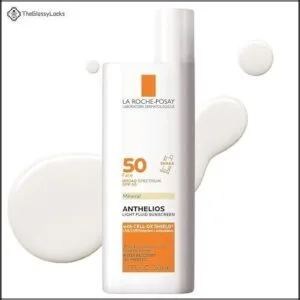
La Roche-Posay’s Mineral Face Sunscreen offers 100% mineral protection with zinc oxide and titanium dioxide, making it perfect for sensitive skin.
It provides broad-spectrum SPF 50 coverage without the dreaded white cast.
The fast-absorbing formula leaves a matte finish while Cell-Ox Shield technology fights free radicals.
It’s water-resistant for 40 minutes and includes soothing La Roche-Posay Thermal Spring Water.
The Skin Cancer Foundation recommends this dermatologist-tested option, but be aware that some users report stinging around the eyes, so patch test first.
Best For: People with sensitive skin seeking a 100% mineral sunscreen with SPF 50 and a matte finish.
- Broad-spectrum SPF 50 protection with antioxidants.
- Fast-absorbing, non-whitening formula with a matte finish.
- Water-resistant for 40 minutes and recommended by the Skin Cancer Foundation.
- May cause stinging or redness, especially around the eyes.
- Some users report dryness or oiliness depending on skin type.
- Potential for a slight white cast on darker skin tones.
2. innisfree Daily UV Defense Sunscreen
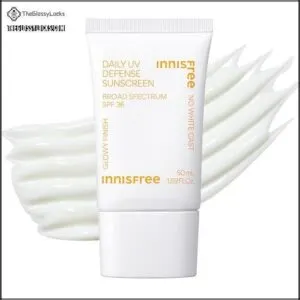
Jeju green tea and cica form the heart of innisfree Daily UV Defense Sunscreen.
This SPF 36 formula delivers lightweight hydration while reducing irritation. You’ll love how it blends seamlessly without leaving a white cast.
The watery texture creates a fresh glow rather than a greasy finish.
Safe for both adults and children, it’s powered by responsibly sourced ingredients from South Korea’s Jeju Island.
The reef-safe formula provides invisible protection in a travel-friendly tube. Many users report it even helps even out redness and trouble spots over time.
Best For: People with sensitive or easily irritated skin looking for lightweight, reef-safe sun protection that blends invisibly.
- Lightweight, watery formula provides hydration without greasiness.
- Reef-safe, responsibly sourced ingredients from Jeju Island.
- Blends seamlessly with no white cast, suitable for adults and children.
- SPF 36 may not be enough for extended sun exposure.
- Some users with deeper skin tones might experience a slight white cast if not thoroughly blended.
- Individual reactions, such as breakouts or greasiness, may vary.
3. Kate Somerville Tinted Mineral Sunscreen Drops
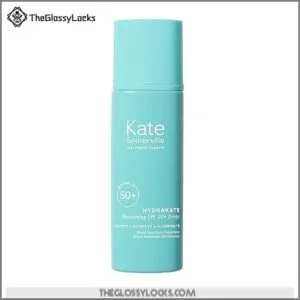
Kate Somerville Tinted Mineral Sunscreen Drops deliver SPF 50+ protection while enhancing skin’s natural glow.
The 24.5% non-nano zinc oxide formula provides gentle, broad-spectrum coverage, making it ideal for sensitive skin.
Ectoin adds extra protection against environmental stressors, while sheer mineral pigments even out your complexion.
It’s a hydrating, reef-safe, and vegan option perfect for daily use.
However, its liquid texture requires careful application to guarantee enough coverage, and some users may find it too moisturizing, especially in humid climates.
Best For: Individuals with sensitive, dry, or normal skin looking for SPF protection with a lightweight, vegan, and illuminating finish.
- Broad-spectrum SPF 50 with 24.5% non-nano zinc oxide.
- Reef-safe, vegan, and cruelty-free.
- Delivers hydration and illumination, suitable for no-makeup days.
- May feel too oily for those with oily or acne-prone skin.
- Potential for slight white cast on darker skin tones.
- Requires careful application to ensure proper coverage.
4. La Roche-Posay Anthelios Sunscreen SPF 60
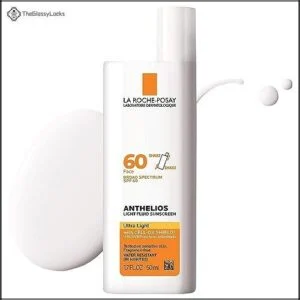
Standing out with its SPF 60 protection and Cell-Ox Shield technology, La Roche-Posay Anthelios is a solid pick for sensitive skin.
Its lightweight, matte finish absorbs quickly and works well under makeup. The formula is fragrance-free, non-comedogenic, and dermatologist-tested, reducing risks of irritation.
It suits normal to combination skin but doesn’t work for everyone—some users experience stinging or sensitivity. A patch test is a must.
If alcohol denat concerns you, exploring alternatives might be worth it for long-term comfort.
Best For: Those with normal to combination skin seeking SPF 60 protection in a lightweight, non-comedogenic formula.
- Broad-spectrum SPF 60 for high UV protection.
- Fast-absorbing, matte finish ideal under makeup.
- Fragrance-free and dermatologist-tested for sensitive skin.
- Contains alcohol denat, which may irritate some users.
- Some users report stinging or sensitivity.
- May not suit very dry or highly reactive skin types.
5. Paula’s Choice SPF 50 Sunscreen
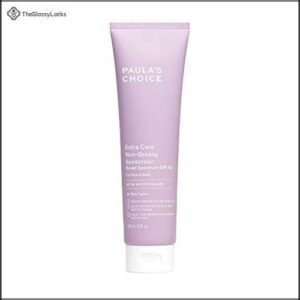
Paula’s Choice SPF 50 Sunscreen is perfect for sensitive skin.
Its lightweight, oil-free formula feels smooth and stays matte, making it great for daily wear.
Broad-spectrum protection shields against UVA and UVB rays, helping prevent sun damage.
Packed with vitamins A, E, and C, plus soothing aloe, it protects and also nourishes the skin.
It’s water-resistant, which makes it ideal for outdoor activities.
Fragrance-free and paraben-free, it’s a smart choice if you’re prone to irritation or need everyday sun defense.
Best For: People with sensitive, oily, or combination skin seeking lightweight, matte-finish sun protection for daily or outdoor use.
- Broad-spectrum SPF 50 protection shields against UVA and UVB rays.
- Lightweight, oil-free formula is non-greasy and ideal for daily wear.
- Water-resistant and enriched with vitamins and soothing aloe for hydration.
- Matte finish may feel too drying for very dry skin.
- Packaging may vary due to ongoing sustainability changes.
- Not budget-friendly compared to some drugstore sunscreen options.
6. Vanicream Mineral Sunscreen Facial Moisturizer SPF 30
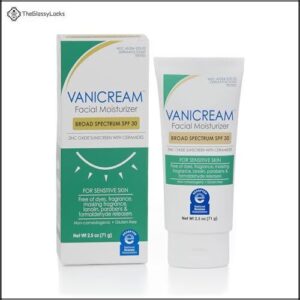
With its gentle, mineral-based formula, Vanicream Mineral Sunscreen Facial Moisturizer SPF 30 is a go-to for sensitive skin.
It protects against sun damage with non-nano zinc oxide, while ceramides lock in moisture to keep skin hydrated.
Lightweight and water-resistant for up to 80 minutes, it’s perfect for active days.
Free from dyes, fragrance, parabens, and gluten, it avoids common irritants.
This non-comedogenic sunscreen absorbs quickly, leaving no greasy residue.
It’s ideal for anyone needing reliable, gentle daily sun protection, and is a great choice for those with sensitive skin due to its mineral-based formula.
Best For: Individuals with sensitive skin who need a gentle, non-comedogenic sunscreen for reliable daily protection.
- Mineral-based formula with non-nano zinc oxide and ceramides for hydration and sun protection.
- Lightweight, water-resistant for up to 80 minutes, and absorbs quickly without leaving a greasy feel.
- Free from dyes, fragrance, parabens, and gluten, making it suitable for sensitive skin.
- May not provide sufficient water resistance for extended activities like prolonged swimming.
- SPF 30 may not be high enough for those seeking maximum sun protection.
- Mineral-based sunscreen can leave a slight white cast on darker skin tones.
7. ISDIN Eryfotona Actinica Mineral Sunscreen
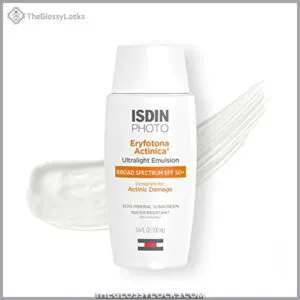
If you’re looking for sun protection that also helps repair damaged skin, ISDIN Eryfotona Actinica Mineral Sunscreen is a standout.
Its lightweight formula features 11% zinc oxide for broad-spectrum UVA/UVB defense, plus Patented DNA Repairsomes and vitamin E to tackle sun damage.
The fast-absorbing, non-greasy texture makes it perfect for everyday use, even under makeup.
Dermatologist-recommended and water-resistant, it’s versatile for all skin types.
With SPF 50+ protection, you’ll feel covered and protected, rain or shine, and it also provides broad-spectrum UVA/UVB defense.
Best For: People seeking a lightweight, non-greasy sunscreen that offers sun protection while repairing existing sun damage.
- Offers high SPF 50 broad-spectrum UVA/UVB protection.
- Clinically proven to repair sun-damaged skin with DNA Repairsomes.
- Lightweight, fast-absorbing, and dermatologist-recommended for daily use.
- May not provide enough hydration for very dry skin types without additional moisturizer.
- Higher price point compared to basic sunscreens.
- Not specifically formulated for intensive outdoor or extreme water activities.
8. EltaMD UV Clear Sunscreen SPF 46
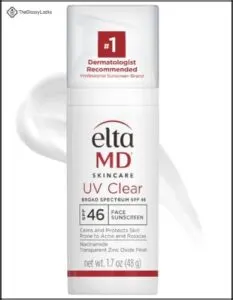
EltaMD UV Clear Sunscreen SPF 46 is a game-changer for sensitive or acne-prone skin.
With 9% zinc oxide and 5% niacinamide, it calms irritation while providing broad-spectrum protection.
The lightweight, fragrance-free formula absorbs quickly without leaving a greasy feel or white cast.
It’s oil-free, dermatologist-recommended, and perfect for daily wear or under makeup.
Users love its hydrating feel and effective sun protection, though the pump dispenser may require patience.
Ideal for anyone needing soothing, reliable sun care you can trust.
Best For: Those with sensitive, acne-prone, or oily skin seeking lightweight, non-greasy sun protection for daily use.
- Broad-spectrum UV protection without white cast.
- Lightweight, oil-free, and absorbs quickly.
- Calms and soothes skin with niacinamide.
- Pump dispenser can be finicky to use.
- Travel size may feel small for the price.
- Bottle labeling may fade over time.
9. CeraVe Tinted Mineral Sunscreen SPF 30
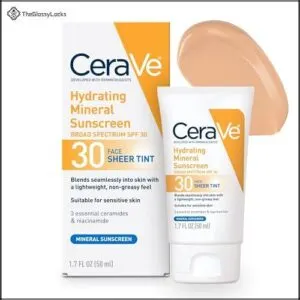
For sensitive skin warriors, CeraVe Tinted Mineral Sunscreen SPF 30 offers a perfect balance of protection and coverage.
This mineral-based formula contains zinc oxide and titanium dioxide, creating a physical barrier against harmful UV rays.
Available in three shades, it blends easily with different skin tones while eliminating the dreaded white cast.
You’ll appreciate its fragrance-free, noncomedogenic formula enriched with niacinamide to calm irritation and three essential ceramides to restore your skin barrier.
The added hyaluronic acid keeps your skin hydrated throughout the day without clogging pores.
Best For: Those with sensitive, acne-prone, or dry skin who want lightweight, tinted SPF protection.
- Mineral-based formula offers broad-spectrum protection with SPF 30.
- Noncomedogenic, fragrance-free, and calms skin with niacinamide.
- Hydrates skin with hyaluronic acid and essential ceramides.
- Only available in three tinted shades, which may not suit all skin tones.
- Requires frequent reapplication every two hours during sun exposure.
- May not provide enough coverage for those seeking a fuller makeup look.
Applying Sunscreen Correctly
You’ll need to apply sunscreen correctly to protect your sensitive skin from harmful UV rays and avoid irritation.
For the best results, use a quarter-sized amount for your face and neck, and wait 15 minutes before sun exposure to allow the product to fully absorb, ensuring complete protection.
Application Tips for Sensitive Skin
Now that you know which sunscreens work best, let’s focus on how to apply them.
For sensitive skin, patch testing new products on your inner arm for 24 hours helps prevent reactions. Consider fragrance-free options to minimize irritation and avoid common irritants.
Apply a quarter-sized amount for your face, using gentle patting motions rather than rubbing to avoid friction.
Always wait 15 minutes before sun exposure, allowing the sunscreen to form a protective barrier.
Reapplication and Water Resistance
Regular reapplication is essential for effective protection.
Water-resistant sunscreens maintain effectiveness for 40-80 minutes while swimming or sweating, but you’ll need to reapply afterward.
For sensitive skin, reapply every two hours during outdoor activities, regardless of sunscreen type.
Higher activity levels require more frequent application, and don’t be fooled by "waterproof" claims—all sunscreens need consistent renewal to protect irritation-prone skin, ensuring effective protection.
Sensitive Skin Protection
Protecting sensitive skin starts with using sunscreen that’s gentle yet effective. Look for options with broad-spectrum coverage, soothing ingredients, and non-comedogenic formulas to keep your skin calm and safe.
Broad-Spectrum Coverage
Broad spectrum SPF isn’t a luxury—it’s a must-have.
It shields you from both UVA and UVB rays, preventing burns and aging.
Look for sunscreen ingredients like zinc oxide or titanium dioxide for mineral efficacy.
Chemical filters can also provide reliable UV protection.
Consistency matters, so choose a broadspectrum sunscreen tested for coverage consistency to keep irritated skin safe and calm, using ingredients that provide broad spectrum protection.
Non-Comedogenic and Oil-Free Options
Many people with sensitive skin also struggle with acne.
Choosing non-comedogenic and oil-free sunscreens prevents pore blockage while protecting your skin.
Look for these features in your sunscreen:
- "Non-comedogenic" label guarantees the formula won’t clog pores
- Oil-free benefits that provide a matte finish without shine
- Lightweight formulas that absorb quickly without feeling heavy
To further prevent breakouts, consider using sunscreens with non comedogenic oils. These options work perfectly for acne-prone skin while maintaining protection.
Soothing and Calming Ingredients for Irritated Skin
Several soothing ingredients can transform your sunscreen experience when dealing with irritated skin.
Look for formulas containing cica benefits for wound healing and anti-inflammatory properties. Thermal water helps calm redness, while shea butter and cocoa butter provide gentle hydration.
Calendula effects include reducing inflammation and promoting healing. Aloe vera offers instant relief for sunburns, and chamomile soothes various skin conditions.
Selecting products with gentle sunscreen ingredients is often helpful. These ingredients make calming sunscreen truly effective for sensitive skin, providing gentle hydration.
Frequently Asked Questions (FAQs)
Which sunscreen is best for irritating skin?
For sensitive, irritated skin, mineral sunscreens with zinc oxide and titanium dioxide work best.
Look for products with soothing ingredients like niacinamide, ceramides, and hyaluronic acid.
EltaMD UV Clear and La Roche-Posay Anthelios are top picks.
What is the best sunscreen for hypersensitive skin?
Dermatologists recommend EltaMD UV Clear for 9 out of 10 hypersensitive skin patients. You’ll love Vanicream Facial Moisturizer or La Roche-Posay Anthelios Mineral sunscreens – they’re fragrance-free, mineral-based, and won’t clog pores.
Why does sunscreen irritate my skin?
Your skin’s reacting to chemical ingredients like oxybenzone or preservatives and fragrances in your sunscreen.
You’ll notice redness, stinging, or itching where you’ve applied it, especially if you have eczema or rosacea.
What sunscreen to use if you are allergic to sunscreen?
Try mineral sunscreens with zinc oxide that are hypoallergenic and fragrance-free.
You’ll want products labeled for sensitive skin or NEA-certified.
EltaMD and Blue Lizard offer good options that won’t trigger reactions.
Can sunscreen cause more irritation?
Yes, sunscreen can cause irritation, especially if you’re using chemical filters.
Your skin might react to ingredients like oxybenzone or fragrances.
Mineral options with zinc oxide and titanium dioxide are typically gentler on reactive skin.
Is expensive sunscreen better for sensitivity?
Money can’t buy skin happiness!
Price doesn’t determine effectiveness for sensitive skin. According to dermatologists, you’re often paying for branding or texture, not protection.
Look for zinc oxide and fragrance-free formulations instead of an expensive price tag.
How long does mineral sunscreen last?
Mineral sunscreen typically lasts about two years when stored properly. You’ll need to reapply it every two hours during sun exposure, regardless of the product’s shelf life.
Can I layer products with sunscreen?
Like pieces in a puzzle, your skincare products can layer with sunscreen. Apply moisturizers first, then sunscreen as your final step. Let each product dry before adding the next one.
Does tinted sunscreen provide enough protection?
Tinted sunscreens can provide adequate protection when they contain proper SPF levels and are applied correctly. You’ll need to use enough product and reapply regularly, just like with untinted versions.
Conclusion
Picture yourself confidently enjoying the sunshine without worrying about irritation.
Finding the right sunscreen for easily irritated skin doesn’t have to be challenging. With mineral-based options and soothing ingredients now widely available, protection and comfort can go hand-in-hand.
Choose products with zinc oxide, skip fragrances, and apply generously. Your sensitive skin deserves care that protects without causing flare-ups.
Remember, the best sunscreen for easily irritated skin is one you’ll actually want to use daily, with a focus on protection and comfort and using products that help you enjoy the sunshine.

